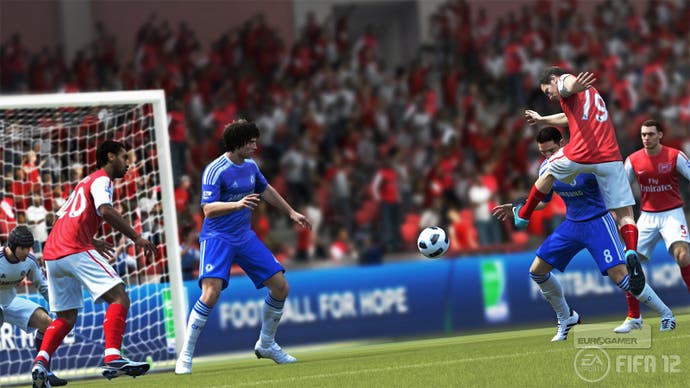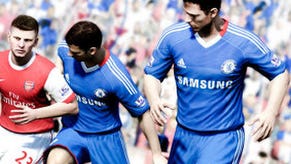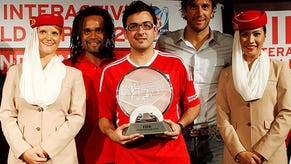FIFA 12
On top of the game.
Here's a question to ponder: will there ever be a FIFA release that feels absolutely complete? That's not to say that any FIFA game, at least in the recent PES-bashing era, has seemed like it's short-changed its audience. It's just that every single year EA Sports kicks out a new FIFA game and, over the last four years, the engine of every new entry in the series has benefited from a ton of tweaks and tucks which improve the in-game experience to the point that going back to the previous year's model seems almost unthinkable.
This year's iteration is no exception; FIFA 11 may have felt weighty and realistic last year, but compared to this year's model it looks clunky and almost arcade-like. So is FIFA like fashion or Facebook in that it will never actually be finished? It's a question the game's line-producer, David Rutter, answers with a large sigh.
"I've been making football games for 15 years," he says, "FIFA's been going for longer than that, and I've not done that many of them. But there's a near-limitless supply of inspiration for the cool stuff we can do. We do as much as we can do each year, but I suspect that by the time we've caught up on all the stuff we want to do, there'll be other ideas in the pipeline."
"I'm not worried about running out of ideas," he says. "I'm worried about how to fit it all in."
Rutter and his team have managed to fit a lot of new content into to this year's FIFA title. The most obvious is in the gameplay - what the line-producer and his team are calling FIFA 12's 'holy trinity' of precision dribbling, tactical defending and the new player impact engine.

The first of these allows players more direct and intimate control of the players in their team; beyond finesse dribbling moves, players can shield the ball with their bodies, as they look for an open man to pass it to. The immediate effect of this is to slow down the pace of the matches somewhat, but as a whole, controlling players is more dynamic. The player feels like they're more firmly in control of the ball at all times, and more aware of where their opponents are. It also allows them a few more options than hoofing it out wide to the wing when they're in and around the box and deluged by defenders.
Tactical defending makes tackling a bit more of a nuanced affair than in previous FIFA titles. Rather than simply barging into attackers, defenders can now contain - or jockey - players approaching them, as well as grab their shirts if the attacker shoots by them.
"We've basically stripped out the overwhelming pressure feature," says Rutter, "where we'd launch defenders up the pitch like homing missiles. We've replaced that with a situation where defenders shepherd attackers into an indefensible position, as would happen in a real-life game."








.png?width=291&height=164&fit=crop&quality=80&format=jpg&auto=webp)




.jpg?width=291&height=164&fit=crop&quality=80&format=jpg&auto=webp)